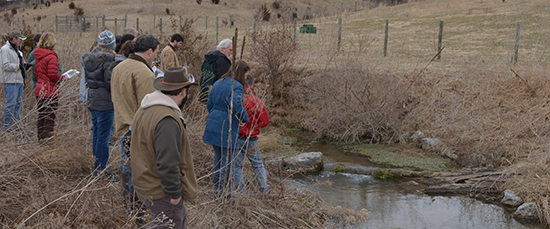Restoration partners share progress, reinvigorate work, build relationships
Stewardship Fund grant recipients came together at an annual forum.

Fencing off a stream from livestock, planting trees along a soon-to-be-shaded river or creating marshland to provide habitat to fish, frogs and birds: restoration projects such as these would not be possible without the hundreds of watershed groups working across the Chesapeake Bay region, or the networking needed to connect restoration partners with their peers.
Each year, the National Fish and Wildlife Foundation (NFWF)—which supports Bay restoration with grants offered through the Chesapeake Bay Stewardship Fund—gives restoration partners a break from their intensive on-the-ground work with the Chesapeake Bay Agricultural Networking Forum. Last week, this forum brought more than 100 grantees together in Staunton, Va., to discuss restoration successes, challenges and solutions to common problems, networking with each other and forming invaluable partnerships.

“Our grantees really are the front lines of the Bay restoration effort,” said Amanda Bassow, NFWF Director of Chesapeake Programs. “We need to arm them with all the knowledge, resources and experience we can. These are the people who are accelerating progress, engaging new partners and new landowners, and continually figuring out new ways to get the job done.”
The forum began with a rapid-fire update from grantees working on close to a dozen projects, ranging from forest buffer plantings to the engagement of so-called "absentee landowners”—or those landowners who do not work their own farmland—in conservation. Field trips in and around Staunton gave participants a hands-on look at areas in which progress is underway. On the Merrifield and Ford farms, for instance, located in the Poague Run watershed, landowners have restored stream banks, protected streamside forests and excluded livestock from sensitive waterways.

“Grantees tell me they love the forum because they get re-energized about their work,” Bassow said. “It’s a community of doers, not finger pointers, and when you get them all in a room together, it’s a powerful thing to see.”
Chesapeake Bay Program Director Nick DiPasquale moderated a session at the forum, and found the event to be a meaningful one.
“For farmers and farm service providers, conservation district staff, government officials, funders and non-governmental organizations, this was a great exchange of ideas and approaches on implementing effective and innovative agricultural best management practices,” DiPasquale said. “This forum should help the community save money, clean up local waterways and keep farmers farming while using creative ways to manage nutrients on their land.”
Read more about the NFWF and the Chesapeake Bay Stewardship Fund.

Comments
There are no comments.
Thank you!
Your comment has been received. Before it can be published, the comment will be reviewed by our team to ensure it adheres with our rules of engagement.
Back to recent stories